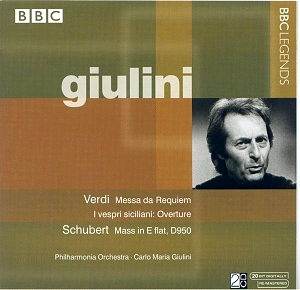GUISEPPI VERDI (1813 - 1901)
I vespri siciliani: Overture 8.50
Messa de Requiem
85.42
 Amy Shuard (sop);
Anna Reynolds (mez); Richard Lewis (ten); David Ward (bass); Philharmonia
Orchestra, Philharmonia Chorus.
Amy Shuard (sop);
Anna Reynolds (mez); Richard Lewis (ten); David Ward (bass); Philharmonia
Orchestra, Philharmonia Chorus.
FRANZ SCHUBERT (1797
-1828)
Mass in E Flat Major. D 950
56.33
 Anne Pashley (sop);
Sybil Michelow (cont); David Hughes (ten 1); Duncan Robertson (ten 2); William
McCue (bass). Scottish Festival Chorus, New Philharmonia Orchestra. Carlo
Maria Giulini
Anne Pashley (sop);
Sybil Michelow (cont); David Hughes (ten 1); Duncan Robertson (ten 2); William
McCue (bass). Scottish Festival Chorus, New Philharmonia Orchestra. Carlo
Maria Giulini
 Recorded: Royal Albert
Hall:- Aug 7 1963 (I vespri siciliani); Royal Albert Hall:- Aug 5 1963 (Requiem)
Usher Hall, Edinburgh. Aug 31 1968 (Schubert) BBC BBCL 4029-2 CD1
75.06 CD2 77.31
Recorded: Royal Albert
Hall:- Aug 7 1963 (I vespri siciliani); Royal Albert Hall:- Aug 5 1963 (Requiem)
Usher Hall, Edinburgh. Aug 31 1968 (Schubert) BBC BBCL 4029-2 CD1
75.06 CD2 77.31

This is a well filled double CD offering from the BBC that uses performances
from the Proms and the Edinburgh Festival of the 1960's. The connecting link
between the concerts is, of course, the conducting of Maestro Giulini in
two major works close to his heart. The whole makes a splendid package that
has an unqualified recommendation.
Verdi was not a believer, hence his Requiem does not have the soul-baring
intensity that one would hear from other great composers works who were writing
from the depths of their faith. What it does have is a dramatic, theatrical
power I have heard described as "the best opera Verdi never wrote". Just
listen, for example, to the Recordare and try to put religious
connotations out of your mind as you do.
The Royal Albert Hall and the Verdi Requiem are suited to each other. The
Philharmonia Chorus is heard at its magnificent best in a recording that
is just about right in its balancing act - the Chorus is marginally favoured
in the big acoustic, yet the big orchestral moments make their mark without
perhaps making the impact those in the RAH might have heard. And what a Chorus
it was in those days. Big, masses of power, with a homogeneity that shows
hours of hard work in rehearsal, sensitive and responsive to the slightest
of nuances in the score.
The choice of soloists for this Prom was interesting. Each of the four, a
very fine all British quartet, was an acknowledged operatic singer used to
projecting his/her voice in large-scale works. For the listener this allowed
the natural balance to be heard without the manipulation that sometimes happens
in a studio recording.
Giulini has a reputation, not altogether justified, for slowing down pieces
and for 'relaxed' tempi. I can only say that at the opening bars of the
Kyrie one is aware of the slow pace. Then that awareness is absorbed
in the feeling that the choice of tempi, though broad throughout, is a valid
one and is 'right on the night'. Speeds never drag which is surely a major
consideration.
In a coherent whole, it is perhaps not fair to mention particular special
moments but one cannot avoid mention of a outstanding Rex Tremendae with
the full Chorus juxtaposed with the four soloists and its gentle ending closing
amen. The Dies Irae passages made a great impact and the beauties
of the Lacrymosa stay in the memory. This performance took place some
months after Giulini's justly famous EMI recording of the Requiem
and, from memory only - with no comparison disc to hand - this offering doesn't
sound too much like a poor relation. The other Prom work, The Sicilian
Vespers, was given a splendidly full-blooded performance.
The source of the Schubert Mass recording is Edinburgh five years later.
Same orchestra (with slight name change) and another different but equally
magnificent Chorus. Again, one was quickly aware of a measured, but
right-sounding choice of tempi throughout. The balance between Orchestra
and Choir was exemplary, and the tapes captured it.
The Schubert Mass is an intense, deeply involving work a world away
from Verdi's colourful masterpiece. The work makes fewer calls on the soloists
and most of its impact and effect depends upon the choir. It needs to be
balanced, responsive, able to convey its feelings in the quiet passages,
yet with power and subtlety when needed . The Scottish Chorus had all of
these skills. In a reading which was a delight especially noteworthy were
the first use of the soloists in Et incarnatus est with the dramatic
outburst massed voices of which followed, and the extended contrapuntal passages
in Et rexurrexit when the clarity of diction was exemplary.
The extra frisson which a live performance gives is apparent and the bane
of live recordings - audience noise - is not a problem. Applause is included
but not allowed to run too long. What a pity that the excellent notes by
Alan Blyth were not extended to allow the text to be included, at the very
least in Latin.
Reviewer
Harry Downey

